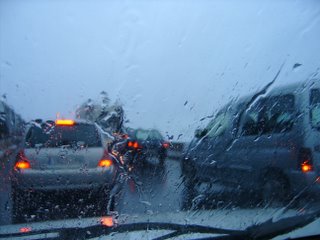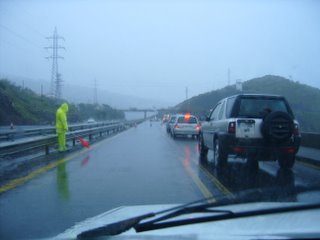The Point of a Lifetime
its purpose and aims
just fitted
into a 20kg suitcase
and flew off
to university
A foreign resident of the Spanish holiday island of Tenerife picking up the reigns of his long lost blog. It failed to help him stop smoking, so now he uses it as an occasional place to put the silly stuff that doesn't fit in the 'proper' things he writes.
 Then we stop. We all stop. And start. And stop. It’s already 5pm and we’re stuck. We weren’t expecting our first procession of the day to be here, on the motorway. And the splats have turned into one large, continuous splosh. But we are in carnival mood and the in-car atmosphere is still jolly.
Then we stop. We all stop. And start. And stop. It’s already 5pm and we’re stuck. We weren’t expecting our first procession of the day to be here, on the motorway. And the splats have turned into one large, continuous splosh. But we are in carnival mood and the in-car atmosphere is still jolly. 5.50pm. We see the saddest person in the world. We both feel deeply sympathetic. He is a policeman standing forlornly by the road and he has been given a little red flag to wave. We imagine him, only this morning, showing up bright and eager to perform his civic duty on a carnival day. He is given a little red flag, and he looks forward to a busy day of self-important flag waving. Perhaps directing carnival floats, or waggling his little flag at over exuberant revellers. Perhaps he even phoned his wife excitedly, to tell her that he had been given his own flag to wave at carnival. She was probably so proud. And then they deposited him beside the rainy motorway, miles from the carnival. All by himself.
5.50pm. We see the saddest person in the world. We both feel deeply sympathetic. He is a policeman standing forlornly by the road and he has been given a little red flag to wave. We imagine him, only this morning, showing up bright and eager to perform his civic duty on a carnival day. He is given a little red flag, and he looks forward to a busy day of self-important flag waving. Perhaps directing carnival floats, or waggling his little flag at over exuberant revellers. Perhaps he even phoned his wife excitedly, to tell her that he had been given his own flag to wave at carnival. She was probably so proud. And then they deposited him beside the rainy motorway, miles from the carnival. All by himself.  Oh, yes, I believe in nursery rhymes… I swallowed the spider to eat the fly. But now I can’t stop eating spiders (well not REAL spiders, obviously. That would be icky. I mean METAPHORICAL spiders – the ones that taste like bacon sandwiches and seconds of jam roly poly).
Oh, yes, I believe in nursery rhymes… I swallowed the spider to eat the fly. But now I can’t stop eating spiders (well not REAL spiders, obviously. That would be icky. I mean METAPHORICAL spiders – the ones that taste like bacon sandwiches and seconds of jam roly poly).  Chilli! Eat some hot chillies and all that sweating must burn off bucket loads of energy. And the more chilli you eat… the more weight you must lose! So that’s the basis of my new dietary plan. I will add chilli to absolutely everything (except when I’m doing restaurant reviews: those chefs can be sensitive types). And then I will eat as much as possible. The pounds will drip off me.
Chilli! Eat some hot chillies and all that sweating must burn off bucket loads of energy. And the more chilli you eat… the more weight you must lose! So that’s the basis of my new dietary plan. I will add chilli to absolutely everything (except when I’m doing restaurant reviews: those chefs can be sensitive types). And then I will eat as much as possible. The pounds will drip off me.I just wrote an article on shopping in the Canaries for a magazine (yes, I do sensible writing, too, and people even pay me!). The Canaries is a special tax zone, so stuff here can be a lot cheaper than the rest of Europe. In the article I was looking at the retail experience on the
Don’t expect these indigenous businesses to have the entrepreneurial initiative that you might be used to, by opening at times when you are likely to want to go shopping, or even displaying their stock so you know what they have. Oh, no. Canarian shopkeepers don’t enjoy over contamination of customers. More customers means more sales, more ordering stock, more cleaning up, more serving … it all hardly bears thinking about. These shops close religiously for the ‘mediodia’, at 1.30 or 2pm, and re-open after a relaxed lunch and siesta at 4.30 or 5pm when they stay open for another three hours or so.
You see, to a great extent, shops here come from a tradition of considering themselves as performing a public service. Every time they flipped the sign on the door to ‘abierto’, they were doing a favour to the general public. They prefer to keep their stock behind a counter. That way, they know where everything is, and it keeps the customers in an orderly queue while they go and fetch things. Of course they have convinced themselves, over the years, that this is providing a better and more personal service to their customer. That’s great, but the whole system collapses when a shop gets two or (heaven forbid) even three customers. The shopkeeper is still offering his personalised service by discussing the weather with the first customer when the third has persuaded themselves that they don’t really need whatever it was they came for, and abandons the idea completely.
And the whole process comes to a complete stop if the customer is one of the many hundreds of thousands of foreigners on this island who don’t speak fluent Spanish. It is excruciating to watch an exasperated German become increasingly red as he tries to explain that he needs a waterproof washer at the ‘ferreteria’ (hardware store). His forefinger jabs in and out of a loop formed by the finger and thumb of his other hand, not dissimilar to a rude sign seen in playgrounds, made by giggling children. Well, maybe there are some comedic consolations to the system!
Generally speaking, the older the area, the more entrenched is this attitude. Such shops have become rare in the tourist dominated south, but are still common in the north. But even there, they are becoming a dying breed. ‘Tenerife News’ reports on the hilarious misadventures of ‘FEDECO’, the association that binds these independent retailers in
Yes, there are social issues to be taken into account. But the hard fact is: if it wasn’t for out of town centres, then a family like us, an hour’s drive away, would never buy anything up north. I work Monday to Friday and I wake up late on Saturdays. So if there were no out of town centres, then the north wouldn’t get any of my money at all. And if
